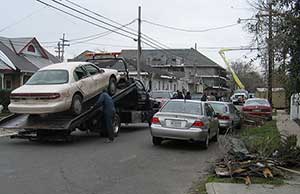Tow-Truck Law Hits Legal Bump
Court Determines That Part of Law Regulating Towing Companies is Unconstitutional
The Ohio Supreme Court today ruled a part of the state's law regulating tow trucks is unconstitutional.

The Ohio Supreme Court today ruled a part of the state's law regulating tow trucks is unconstitutional.
In a dispute between the city of Cleveland and the state over the regulation of towing companies, the Supreme Court of Ohio ruled today that a portion of the state law regulating tow trucks is unconstitutional.
In a unanimous decision, the court upheld as constitutional the first sentence of R.C. 4921.25, which gives the Public Utilities Commission of Ohio (PUCO) the authority to regulate towing companies. However, the court severed the statute’s second sentence, which states that towing companies are not subject to municipal ordinances, rules, or resolutions that provide for the licensing, registration, or regulation of those companies.
Justice Judith Ann Lanzinger, who wrote the court’s opinion, explained that the statute’s second sentence violates the home-rule authority granted to municipalities by the Ohio Constitution. That section, known as the Home Rule Amendment, provides cities, counties, and townships with the right to adopt and enforce ordinances as long as they do not conflict with general state laws.
In 2003, the General Assembly passed a law putting the PUCO in charge of regulating towing companies as for-hire motor carriers. Six years later, the city of Cleveland sought a declaratory judgment from the Cuyahoga County Common Pleas Court that R.C. 4921.25 (originally 4921.30) violated the constitution’s Home Rule Amendment. The court determined, however, that the law was constitutional, and the city appealed to the Eighth District Court of Appeals.
The appellate court held that the entire statute, made up of two sentences, was unconstitutional. Today’s Supreme Court decision in part affirms and in part reverses the Eighth District’s judgment.
Justice Lanzinger wrote that a 2008 Ohio Supreme Court case (Mendenhall v. Akron) established three criteria for when a state statute takes precedence over a local ordinance: “’(1) the ordinance is an exercise of the police power, rather than of local self-government, (2) the statute is a general law, and (3) the ordinance is in conflict with the statute.’”
Noting that no one disputes that city laws regulating towing entities are a matter of police power or safety, Justice Lanzinger turned to whether R.C. 4921.25 is a general law.
Applying the four-part test set out in the Supreme Court’s decision in Canton v. State (2002), she determined that the tow-truck regulation statute is a general law. Specifically, the court held the statute is part of statewide and comprehensive legislation to regulate for-hire motor carriers, and it applies and operates uniformly throughout the state. The statute also is an exercise of the state’s police power and, in its entirety, does not merely limit municipal regulations. The law also applies to all entities engaged in towing operations in the state.
Justice Lanzinger concluded, however, that the statute’s second sentence, which bars municipal regulation of towing companies, violates the third part of the Canton test because it unconstitutionally limits the power of municipalities to make their own laws.
“Unlike the first sentence of R.C. 4921.25, which subjects towing entities to PUCO regulation, the second sentence fails to set forth any police, sanitary, or similar regulations,” she wrote. “Furthermore, the broad language of the second sentence of R.C. 4921.25 directly contradicts the language of Article XVIII, Section 3 of the Ohio Constitution, which provides that ‘[m]unicipalities shall have authority * * * to adopt and enforce within their limits such local police, sanitary and other similar regulations, as are not in conflict with general laws.’ Although R.C. 4921.25 places towing entities under the PUCO’s regulation as ‘for-hire motor carriers,’ there may be areas in which the PUCO has not regulated, allowing municipalities to adopt and enforce regulations in those areas. We will not speculate by identifying these areas …. It is enough to say that municipalities may supplement state law in these unregulated areas, provided that the city ordinances do not conflict with general laws.”
She explained that the General Assembly may not enact laws that prohibit the municipal home-rule authority granted in the Ohio Constitution. In removing the second sentence from the statute, she stated that the court adheres to its precedent regarding severance of laws, and severing the sentence is an appropriate and suitable remedy.
Because the issue in this case concerned the constitutionality of R.C. 4921.25, Justice Lanzinger noted that the court was not asked to consider whether Cleveland’s ordinances related to towing companies conflict with any PUCO regulations. “The question of which city ordinances survive as nonconflicting remains for another day,” she wrote.
Justice Lanzinger’s opinion was joined by Chief Justice Maureen O’Connor and Justices Paul E. Pfeifer, Sharon L. Kennedy, Judith L. French, and William M. O’Neill. Justice Terrence O’Donnell concurred in the judgment of the court and the second paragraph of the opinion’s syllabus, which states, “R.C. 4921.25 is a general law that will prevail over conflicting municipal ordinances, but the second sentence of the statute purporting to limit municipal home-rule authority violates Article XVIII, Section 3 of the Ohio Constitution.”
2012-1616. Cleveland v. State, Slip Opinion No. 2014-Ohio-86.
 View oral argument video of this case.
View oral argument video of this case.
Please note: Opinion summaries are prepared by the Office of Public Information for the general public and news media. Opinion summaries are not prepared for every opinion, but only for noteworthy cases. Opinion summaries are not to be considered as official headnotes or syllabi of court opinions. The full text of this and other court opinions are available online.
Acrobat Reader is a trademark of Adobe Systems Incorporated.


